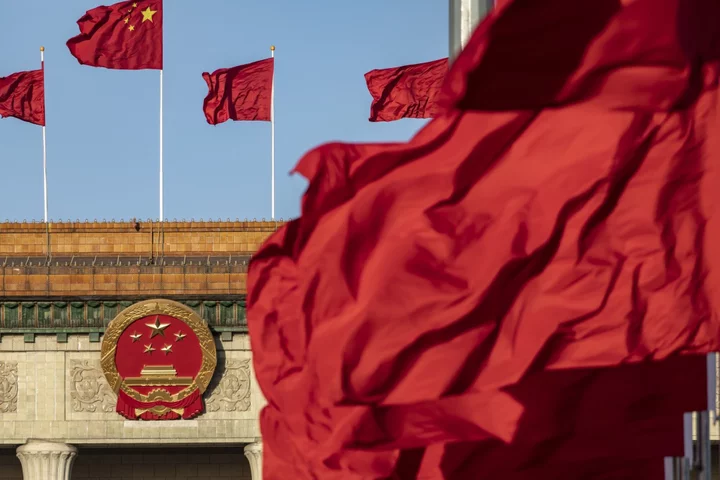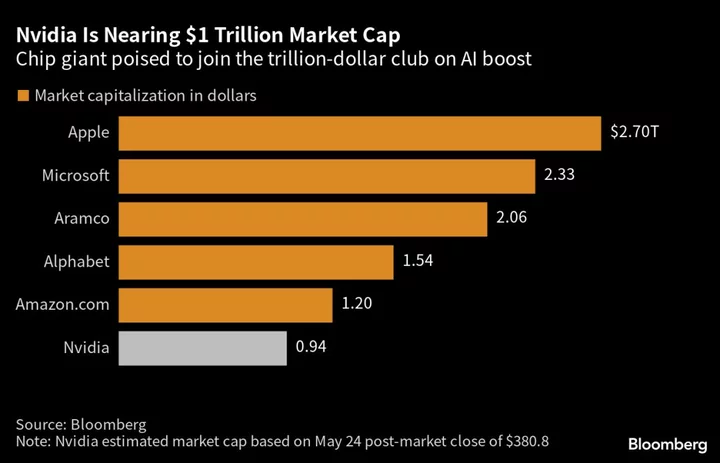China has loosened some of the guardrails it proposed for ChatGPT-style services months ago, as it acknowledges the need to compete for global leadership in artificial intelligence.
The finalized guidelines, one of the world’s first major moves to regulate the nascent technology, removed some specific restrictions from the initial draft released in April, signaling a more flexible and accommodating approach.
The 24 guidelines, set out in a statement Thursday, will go into effect on Aug. 15 and will be overseen by seven state agencies, led by the Cyberspace Administration of China, the nation’s top internet regulator. The National Development and Reform Commission along with the country’s education, science and technology ministries have also been added in the final version.
Among the various provisions are requirements for platform providers to carry out a security review and register their services with the government, as was required in the April draft. While the final edition still places much of the regulatory burden on platforms, it injects a focus on development and innovation alongside security safeguards for the strategic AI industry, which lies at the core of Beijing’s tech rivalry with Washington.
“The final version of the law significantly watered down many stringent requirements in the earlier draft released by the CAC, sending a strong signal of cautious and tolerant approach in the oversight of generative AI,” said Angela Zhang, director of the Center for Chinese Law at the University of Hong Kong.
Offshore providers of generative AI tools — if they are aimed at Chinese residents — must also comply with the set of rules, but Chinese-developed tools that only serve overseas users are exempted.
“This means more opportunities will be in enterprise-facing applications and people will be more cautious about consumer-facing entrepreneurship,” said Frances Du, founding partner of J Ventures. “However, now that there are seven agencies involved, that will make it harder to gauge the specific execution style.”
The official guidelines remove provisions from the draft that included fines as high as 100,000 yuan ($14,000) for violations, as well as the requirement for platform operators to act within a three-month grace period to rectify problematic content. The articles encourage “the use of secure and trustworthy chips, software, tools, algorithms, and data sources,” and urge China’s developers of AI chips, models and software to help set international standards and pursue technological exchange.
Read more: Billionaires and Bureaucrats Mobilize China for AI Race With US
The document is the product of months of consultation between the government and industry players. China’s major internet companies, from Alibaba Group Holding Ltd. and Baidu Inc. to JD.com Inc., have jumped into the frenzy to build the country’s equivalent to OpenAI’s ChatGPT. China’s regulation of the nascent sector will offer one model for the orderly development of AI and its distribution as a service for businesses and consumers.
Legal experts had raised concerns after the draft version of the regulations, saying it placed the bulk of responsibility for governing AI content on the platform operators. The fear is that overly onerous regulations could limit the industry’s development, at a time when China is seeking to catch up to and surpass the US in the technology.
You Chuanman, director of the IIA Center for Regulation and Global Governance at the Chinese University of Hong Kong’s Shenzhen campus, said the final version of the regulations appeared to allow greater flexibility by removing specifics in the grace period and by adding a greater focus on promoting development.
“A clear-cut deadline of three months could be a daunting challenge,” You said. “In the overall content, there are quite a few additions of clauses to promote development, and there is more emphasis placed on the use of existing legal tools.”
Changes in the final guidelines:
- Greater focus on balancing AI industry development
- Article 3: “The country will persist in paying dual attention to development and security, promoting the principle of combining innovation and legal governance, implementing effective measures to encourage innovation and development in generative AI, carrying out regulation for generative AI services that is tolerant and cautious and takes into account different types and levels.”
- Removed specifics in punishments and constraints for platform operators
- Article 17: “Generative AI services that can provide capabilities related to public opinion or social mobilization should carry out a security review based on the country’s relevant regulations, and should fulfill the algorithmic filing, changes, and de-registration processes under the country’s Internet Information Service Algorithmic Recommendation Management Provisions.”
- Removed language in draft that list out a three-month period for “improving model training and other methods to prevent recurrence” of content that violates the guidelines
- Removed language in draft that list out punishments between 10,000 yuan and 100,000 yuan
- Stronger language on data privacy and collection
- Article 11: “Providers should, based on the law, act in a timely manner to accept and process individual requests to look up, copy, revise, supplement, or delete personal data.”
- Exemptions for foreign-facing AI service
- Article 2: “For industry groups, businesses, education and research institutions, public cultural institutions, and relevant professional institutions involved in the development and application of generative AI technologies, those generative AI services that are not targeted at the domestic public are not applicable in these regulations.”
- Added article on government data requests
- Article 19: “The relevant authorities shall carry out supervision and inspection of generative AI services in accordance with their responsibilities, and providers should cooperate based on the law and on the requirements for the training data sources, scale, type, and labeling rules, as well as provide explanation for the algorithm mechanisms and provide the necessary technology, data, etc. for support and assistance.”
- Added provision on obtaining official certification
- Article 23: “Legal and administrative regulations require providers of generative AI services to obtain the relevant administrative approvals, and providers should obtain the approvals based on the law.”
(Adds details from the regulations and comment)
Author: Sarah Zheng, Zheping Huang and Jane Zhang









